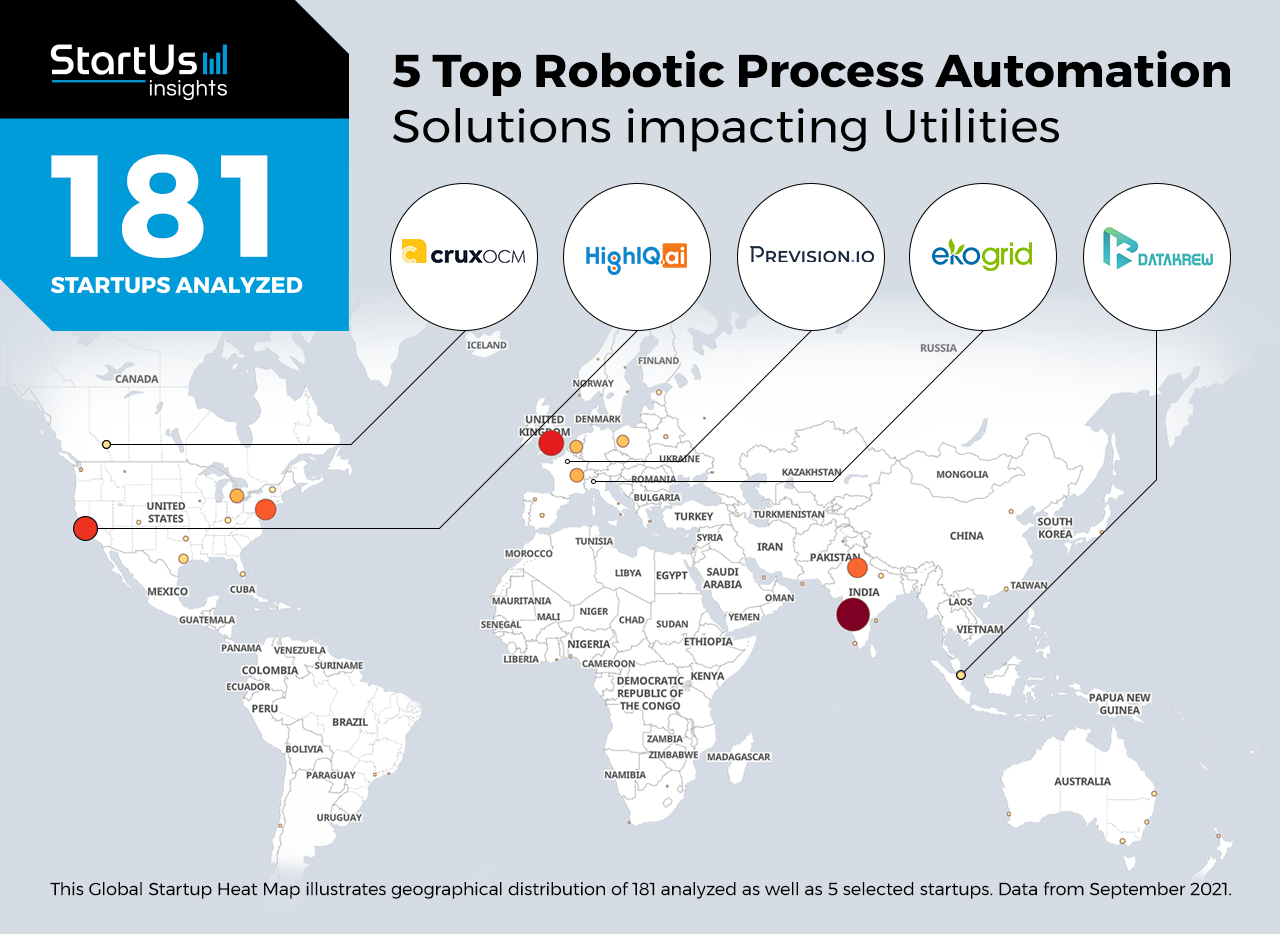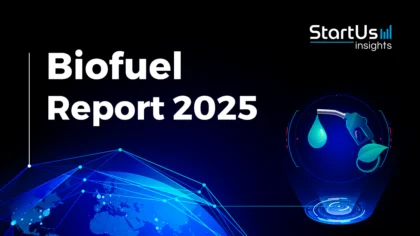Staying ahead of the technology curve means strengthening your competitive advantage. That is why we give you data-driven innovation insights into the utility sector. This time, you get to discover 5 hand-picked robotic process automation (RPA) solutions impacting utilities.
Global Startup Heat Map highlights 5 Top Robotic Process Automation Solutions impacting Utilities out of 181
The insights of this data-driven analysis are derived from the Big Data & Artificial Intelligence-powered StartUs Insights Discovery Platform, covering 2 093 000+ startups & scaleups globally. The platform gives you an exhaustive overview of emerging technologies & relevant startups within a specific field in just a few clicks.
The Global Startup Heat Map below reveals the distribution of the 181 exemplary startups & scaleups we analyzed for this research. Further, it highlights 5 utility startups that we hand-picked based on criteria such as founding year, location, funding raised, and more. You get to explore the solutions of these 5 startups & scaleups in this report. For insights on the other 176 robotic process automation solutions impacting utilities, get in touch.
Prevision develops Utility Enterprise AI
Utilities generate large amounts of data and are increasingly using advanced analytics and artificial intelligence (AI) to interpret it. Further, more and more utility companies are digitizing their operations. Robotic process automation (RPA) solutions simultaneously enable both of these transformations. This helps utility companies minimize human errors and save costs and time in different operations.
French startup Prevision develops a utility enterprise AI solution. It combines aerial, seismic, weather, and geodata to optimize the maintenance of equipment and infrastructure. By deriving insights from complex data, it improves the efficiency of production and transportation for energy companies and utilities. The startup’s solution improves industrial safety and reduces inventory as well as churn.
Crux OCM provides Control Room Automation
Control room operations require a large number of manual commands. This causes frequent fatigue among workers, lowering safety and performance. This is why utilities seek to replace manual operations with RPA-based solutions. Control room automation solutions leverage AI and RPA to automate routine tasks. This enables utilities to increase productivity without placing a further burden on control room operators or other teams.
Crux OCM is a Canadian startup that offers a control room automation solution. The startup’s platform, gatherBOT, uses robotic industrial process automation (RIPA) to create automated procedures and checklists for oil and natural gas gathering system transportation and storage. By automating pressure and flow controls, it reduces flow variations as well as human errors. For oil and gas companies, this eliminates throughput delays and ensures consistent batches come at consistent intervals.
HighIQ offers Digital Workforce as a Service (DWaaS)
RPA or software robots are capable of automating repetitive tasks and improving efficiency in utility operations. For some of these tasks, such as gathering information from documents, they are orders of magnitudes faster than human workers. For such roles, utilities are increasingly relying on RPA-powered digital workers. This makes the companies’ human workforce available for more tedious tasks.
HighIQ is a US-based startup that provides Digital Workforce as a Service. Bumi Energy, the startup’s solution, extracts unstructured data from contracts. It uses RPA-enabled digital workers to automatically transform this data into structured information for contract analysis. With energy contract abstraction, the startup’s solution analyzes different types of contracts that utility companies are involved in to inform data-driven decisions.
ekogrid enables Real-time Grid Monitoring
Real-time grid monitoring helps utilities to meet demand more effectively as well as identify leaks or underperforming assets. However, both energy and water grids are spread over large areas and have thousands of distributed assets. Traditional analytical models are unable to effectively handle modern grids. This is why startups are utilizing RPA-enabled solutions to improve the efficiency of grid monitoring.
Italian startup ekogrid develops an internet of things (IoT) solution for real-time grid monitoring. It automates remote control, providing custom reports, as well as data analytics and calculation of key performance indicators (KPIs). It also runs advanced diagnostics across thousands of devices across grids to identify underperforming assets. This enables water and power companies to reduce costs and improve distribution efficiency.
Datakrew advances Energy Automation
Accuracy and safety are critical for energy utility providers. With the advancements in smart grids, companies seek to offer features like grid balancing and transactional energy solutions. This is why utility startups are advancing energy automation with RPA. With compliant automated processes, RPA-based solutions improve both productivity and energy savings.
Singaporean startup Datakrew builds an energy automation platform. Enersave, the startup’s solution, combines RPA, IoT, and data security to capture electrical load profiles. This allows energy utilities to automate load control, leading to proactive energy savings. Beyond utilities, the startup’s platform serves the energy balancing needs of banks, buildings, and industries.
Discover more Utility Startups
Utility startups such as the examples highlighted in this report focus on immersive technologies, digital management, and blockchain. While all of these technologies play a major role in advancing utilities, they only represent the tip of the iceberg. To explore more utility technologies, simply get in touch to let us look into your areas of interest. For a more general overview, you can download one of our free Industry Innovation Reports to save your time and improve strategic decision-making.









